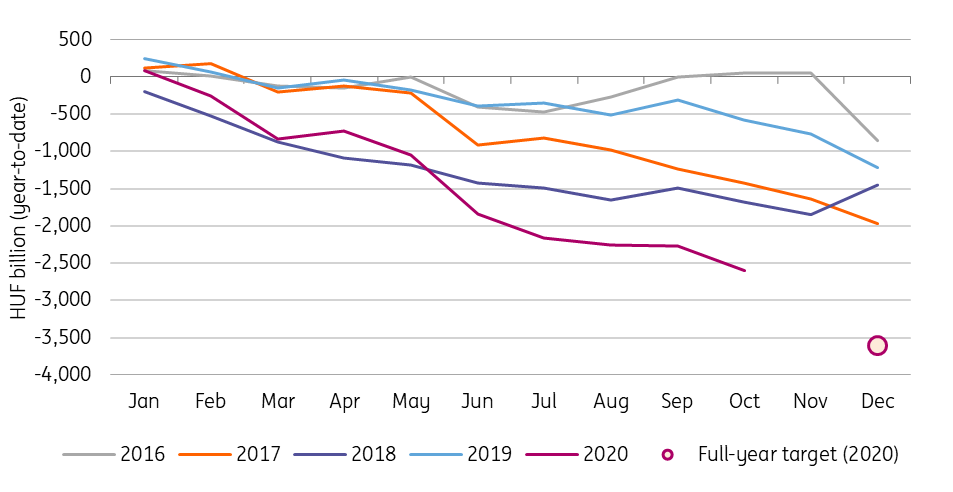Hungarian budget deficit expands further
Despite a record high monthly deficit in October, the budget is still on track to be in line with the year-end target even with the newly announced measures
The general government’s budget deficit increased by HUF 333.7bn in October, a record high monthly shortfall historically in the tenth month of the year. This translates into an accumulated cash-flow based deficit of HUF 2,604bn in the January–October period. Compared to the same period last year, it is 4.5-times higher, so a HUF 2 trillion extra shortfall.
The statement from the Ministry of Finance is again short in detail when it comes to budgetary revenues. However, there is one important data we can still find. Brussels only transferred HUF 88bn related to EU projects in October. This puts the year-to-date inflow at HUF 997.4bn. In contrast, as the government is still pre-financing the EU-projects the related budgetary spending sits at HUF 1,642bn.
Year-to-date budget balance of the government

So, roughly 25% of this year’s cash-flow based deficit is coming from the EU related expenditure. Another 23% of the deficit (HUF 593.3bn) is accumulated due to the direct costs related to Covid-19 measures. On top of that, the Ministry of Finance’s press release sheds light on several projects (competitiveness enhancing programmes, infrastructural developments etc.) which are significantly enhancing the cash-flow based deficit.
Checking the 12-month rolling monthly data, the HUF 3,247.6bn shortfall by October could mean a 6.9% deficit-to-GDP ratio (calculating with our GDP forecast). So, based on our figure, there could be some room for more spending without jeopardising the upper level of the target range of 7-9% of GDP. And this extra room will be used quite soon as the government announced stricter lockdown measures for at least the upcoming 30 days. This includes the closure of restaurants and hotels for tourists.
12-month rolling budget deficit

In the meantime to ease the financial hit on hotels and restaurants, the government will reimburse 80% of the reservations in hotels, and restaurants will be exempted from paying social security tax during that period and the budget will pay half the salary of employees. Of course, there is a condition: keeping hotel and restaurant staff on payrolls and pay salaries. This will show up in the November deficit figure, although according to our calculations, it is only a HUF 35-50bn (~0.1% of GDP) package.
This publication has been prepared by ING solely for information purposes irrespective of a particular user's means, financial situation or investment objectives. The information does not constitute investment recommendation, and nor is it investment, legal or tax advice or an offer or solicitation to purchase or sell any financial instrument. Read more
Tags
HungaryDownload
Download snap